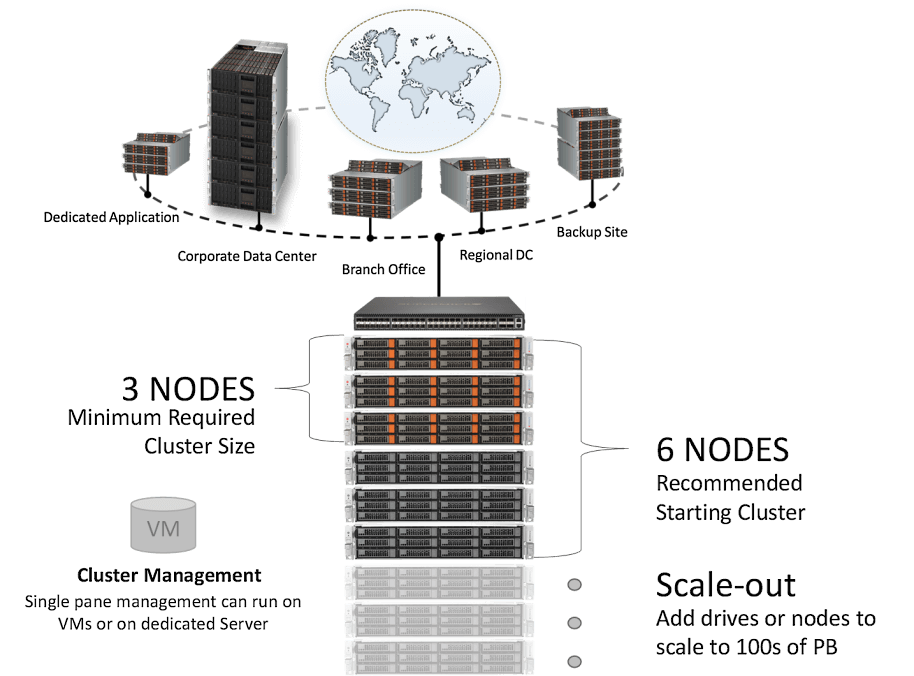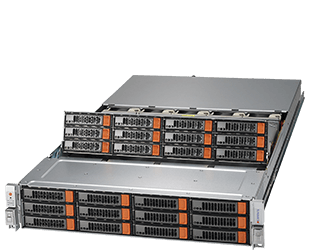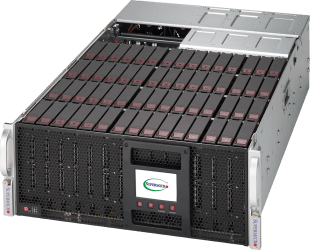On-Premises, Private Cloud Storage

- Enterprise-Ready Scale-Out File and Object Storage
- Linear Scaling of Capacity and Performance
- High Availability Data Protection and Geo-Resiliency
- Hybrid-Cloud Ready with Data Orchestration and Mobility
- Lower TCO compared to Traditional Storage Deployment
Scality RING Software-Defined Solution enables both performance-optimized and capacity-optimized storage deployments with automated data durability levels using erasure code and replication data protection methods, including geo-distribution capabilities.
The solution delivers a petabyte-scale storage framework offering cost-effective scaling, performance, and resiliency paired with Supermicro’s predefined hardware configurations that offer users an appliance-like deployment and service levels to meet enterprise requirements.1
With this solution customers can deploy both performance-optimized and capacity-optimized storage, varied data durability levels, and small-to-large object or file support in a single global namespace. Users can operate and manage extremely large-scale, globally dispersed storage operations simply and cost effectively, automating many common storage operations. RING Supervisor UI is a comprehensive, unified portal for all aspects of monitoring, management, and maintenance.
1 4 hour and next business day break-fix hardware service available in most major cities
Scality® RING®
The RING software can be hosted on standard x86 servers with a wide choice of popular Linux distributions, and requires no kernel modifications. This approach decouples Scality from maintaining hardware compatibility lists (HCLs) and allows them to bring support of new platforms to market much faster. The use of commodity components also extends to the network elements with 10/40/100GbE interfaces acceptable for both the external connector interfaces and the internal RING interconnect fabric.
This flexibility makes it possible to construct capacity-optimized RINGs or performance-optimized RINGs. In all cases, the RING software abstracts the underlying physical servers and hard disk drives, and can exploit the lower-latency access characteristics of SSD storage to maintain its internal metadata. RING is designed to scale out over time, across various hardware vendors, server generations, and densities expected as a normal part of the RING platform lifecycle.
Supermicro Scality RING Solution Advantages
Starting with as few as 3 storage servers featuring either 2U 24-Bays or 4U 60-Bays, customers can start with small deployments that can be dynamically scaled by adding drive packs to grow node capacity or add entire nodes, scaling-out both capacity as well as storage bandwidth.
Key Solution Features and Benefits:
- Availability
- Stretched (synchronous) multi-site deployment for site failure protection
- Asynchronous geo-replication or disaster recovery
- Concurrent multi-site file access
- Scalability & Performance
- Start small and grow to hundreds of Petabytes
- Linear Performance Scaling across thousands of servers, multiple sites, and an unlimited number of files/objects
- RING components are independently scalable
- Aggregate RING connectors achieve tens of gigabytes per second throughput and beyond
- Data Access
- Native AWS S3 and file (NFS, SMB) storage interfaces in one consolidated system
- Fully parallel, scale-out with POSIX-style file system
- Managability, Service & Support
- Browser-based administrative interface with full topology view, monitoring, reporting, and graphing
- RING status with Zone, Server, and Node details
- Full management and control with rich and scriptable CLI
- Automated disk failure detection and handling framework
- Integrated server management
Supermicro Scality® RING® Reference Architecture

| Category | Throughput-Optimized Servers | Capacity-Optimized Servers | |||
|---|---|---|---|---|---|
 |  | ||||
| Reference Solution Name | Simply Double for Scality RING | Top Loading 60-Bay for Scality RING | |||
| Base Server SKU | SSG-6029P-E1CR24H | SSG-6049P-E1CR60H | |||
| Approx. Usable capacity with 6-node cluster | Fully-Populated Systems: 1120TB | Half-Populated Systems: 560TB | Fully-Populated System: 2880TB | Half-Populated System: 1440TB | |
| Form Factor | 2U x 24x 3.5" Drive Bays | 4U x 60x 3.5" Drive Bays + 6 NVMe Bays | |||
| System Dimensions WxHxD | 17.2" (437mm) x 3.5" (89mm) x 34" (863mm) | 17.2" (437mm) x 7" (178mm) x 30.2" (767mm) | |||
| TPM 2.0 | (optional) | (optional) | |||
| CPU | Intel® Xeon® Scalable processors | ||||
| Memory | 192GB (Supports up to 3TB per node) | 384GB (Supports up to 3TB per node) | |||
| Storage Controller | 2x 3108-based Hardware RAID controllers with Flash-backed cache protection. Main storage bays and OS/Boot drives HW RAID protected. | ||||
| NIC |
| ||||
| Storage Devices | 12TB, 3.5" 7K RPM SAS HDD | ||||
| Populated | Fully-Populated Systems: 24x | Half-Populated Systems: 12x | Fully-Populated System: 60x | Half-Populated System: 30x | |
| NVMe Cache Device2 | 6-node cluster or larger: 1x 1.6TB NVMe per node | 6-node cluster or larger: 1x 3.2TB NVMe per node | |||
| OS/Boot Devices | 2x 1TB, 2.5" SATA SSD (HW RAID/Mirrored) | ||||
2 3-node minimum cluster configurations require mirrored NVMe cache devices, per node